Your event is over. Exhibitors are packing up, keynote speakers are wrapping up their presentations, and attendees are saying their final goodbyes. But is your event officially over? For event planners, the post-event strategy phase has just begun!
Keep reading to find several ways to use event recaps and post-event engagement strategies to drive value and maintain connections with attendees, even after festivities have concluded. In no time, you'll start increasing your event's reach, nurturing attendee loyalty, and building momentum for future conferences.
What's Inside:
- 10 benefits of post-event marketing
- 6 event recap ideas for post-event engagement
- Write an event summary
- Send an event follow-up email
- Create an event recap video
- Create a post-event social media campaign
- Create an event marketing drip campaign
- Create a survey for post-event data collection

10 Benefits of Post-event Marketing
Post-event marketing is an essential component of any successful event strategy. While your conference may be over, there are still plenty of opportunities for you to impress attendees, keep their excitement high, and improve their likelihood of registering again for next year's event. Ten benefits of post-event marketing include the following:
1. Thank attendees and speakers for coming.
Writing a thank you letter to sponsors and attendees not only shows appreciation for their time and attendance but also reinforces a positive impression of your event and brand. Express your support to instantly build rapport and encourage everyone to engage with your future events.
2. Showcase conference exhibitors and sponsors.
By highlighting the contributions of exhibitors and sponsors, you can add value to paid packages through valuable exposure. This is a surefire way to boost your chances of continued event sponsorships. You might even catch the attention of new partnerships or exhibitors.
3. Share photos and videos from the event.
Sharing visually appealing photos and videos captures the essence of the event and allows those who attended to relive their experiences. Additionally, it creates FOMO (fear of missing out) among those who didn't attend, potentially boosting audience participation and attendance at future events.
4. Highlight key metrics and statistics.
Providing attendees with key metrics and statistics from the event (such as attendance numbers, engagement rates, or survey results) demonstrates transparency and reinforces the event's success. It also helps in building credibility for your future events. Use data to create intrigue and excitement!
5. Create social media buzz about the event.
Leveraging event social media marketing can instantly create buzz post-event. Keep the conversation going and extend the event's reach beyond its duration by creating engaging posts, utilizing branded hashtags, and harnessing user-generated content to sustain interest in your brand or organization.
6. Survey attendees for post-event feedback.
Gathering feedback through conference surveys allows you to understand attendees' experiences, preferences, and areas for improvement. Incorporating this feedback into future event planning demonstrates responsiveness and a commitment to delivering value to your audience.
7. Maintain connections with conference attendees.
Continuing to engage with attendees post-event through event email marketing, community forums, or exclusive content keeps your brand top-of-mind and develops a sense of belonging among participants. It also lays the groundwork for nurturing long-term relationships and boosting loyalty.
8. Remind attendees of your next event.
Always capitalize on the momentum generated by your most recent event! One of the easiest post-event marketing strategies is to use timely reminders to share knowledge of upcoming events or related activities. This prompts attendees to mark their calendars or get approval to attend an event in advance.
9. Attract event sponsors and exhibitors.
By showcasing the success and impact of your event, you demonstrate the value proposition for potential sponsors and exhibitors. Highlighting previous sponsors' and exhibitors' positive experiences can also encourage others to partner with you in the future.
10. Celebrate your event planning team's successes!
Recognizing and celebrating your team's efforts and achievements not only boosts morale but also reinforces a culture of excellence and teamwork within your organization. It acknowledges everyone's contributions and sets a positive tone for future planning of events.
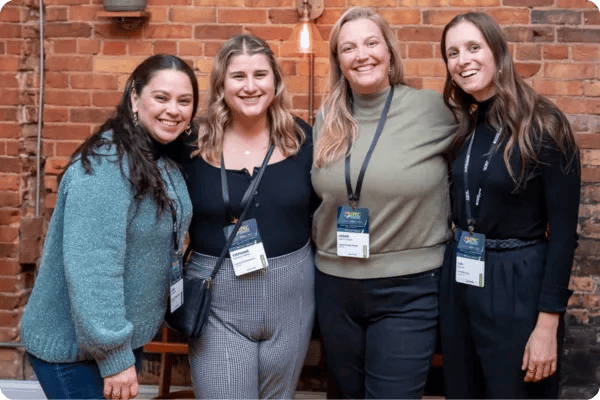
6 Event Recap Ideas for Post-event Engagement
As a conference comes to an end, your post-event engagement strategy begins. A well-executed event recap can help you reignite enthusiasm, gather valuable attendee feedback, and lay the groundwork for increased event attendance in the future.
In this section, we'll explore a variety of creative event recap ideas designed to maximize post-event engagement. Whether you're looking to solicit feedback, improve your net promoter score (NPS), or simply keep the conversation going, these event recap ideas will help you create multiple event marketing touchpoints that keep attendees wanting to come back for more.
1. Write an event summary.
A summary of an event is a brief overview of the event that highlights its purpose and significance. For example, an event marketer might use a post-event summary to summarize the most noteworthy moments, sessions, or speakers from the event. She might also highlight key insights or lessons learned from the event that attendees can apply to their own lives and professions.
If you're wondering what to include in your summary, think of it like a post-event report. What key takeaways, memorable moments, and pertinent statistics can you highlight? Make it even more exciting by bundling your summary with other useful information, such as announcements of upcoming events or a link to a photo/video gallery of the event.
👉 Once you've completed this step, see our next section: "Send an event follow-up email."
Use This Event Recap Sample Template:
"Dear [Attendee's Name],
As we look back on [Event Name], we wanted to take a moment to extend our gratitude for your participation and contribution to making this experience a great success. Check out our recap of everything we were able to accomplish in [YEAR]:
- A Look at [Event Name]: Write up a general overview of key themes, sessions, and discussions.
- Our Favorite Moments: Pick a few moments from the event that made it unforgettable.
- Key Takeaways: Highlight key learnings, actionable insights, or fun stats from your event.
- Exciting Announcements: Share upcoming events, workshops, and initiatives you've planned.
- Photo Gallery: Post a few candid snapshots that capture the energy and enthusiasm of the event.
- Stay Connected: Link to your event's website, social media pages, and community groups.
We're immensely grateful for your support and enthusiasm throughout [Event Name], and we're excited to continue our journey together. If you have any feedback, suggestions, or ideas for future events, please fill out our post-event survey here.
Thank you once again for being a part of [Event Name]. We look forward to seeing you at our upcoming events and continuing to build meaningful connections in the days ahead."

2. Send an event follow-up email.
Never underestimate the power of sending a follow-up email after a conference! This event marketing strategy is a key part of maintaining good relations with participants and increasing attendance at future meetings.
You’ll also build rapport with attendees, share helpful insights, and highlight success data (such as how many people attended, how much money was raised, etc.) If you’re looking for inspiration, there are dozens of thank-you email templates you can use to follow up with attendees.
How to Write a Conference Follow-up Email:
Writing a conference follow-up email is a crucial step in maintaining engagement with attendees and maximizing the impact of your event. Here's a step-by-step guide as an event recap template:
- Choose an Engaging Subject Line: Grab recipients' attention and entice them to open the email. When I send emails, I try to incorporate elements such as personalization, urgency, or curiosity to increase open rates. you can also use 1-2 emojis, or reference the event by name.
- Personalize the Greeting: Begin your email with a personalized greeting to make recipients feel valued and acknowledged. Try using their first name to add a personal touch.
- Express Gratitude: Open the email with a sincere expression of gratitude for attendees' participation in the conference. Thank them for their time, contributions, and engagement throughout the event.
- Recap Conference Highlights: Reference your event summary and choose your favorite conference highlights, focusing on key sessions, speakers, and insights shared.
- Share Valuable Insights: Offer attendees additional value by sharing insights, resources, or materials related to the topics discussed at the conference. This could include presentation slides, recordings of sessions, or links to relevant articles or resources.
- Highlight Success Metrics: Showcase the success of the conference by sharing key metrics and achievements. Highlight attendance numbers, participant feedback, or any other impactful data points that demonstrate the value and impact of the event.
- Request Feedback: Encourage attendees to share their feedback and insights about the conference experience. Include a link to a post-event survey or feedback form where they can provide their thoughts, suggestions, and areas for improvement.
- Include a Call-to-Action: End the email with a clear call-to-action that prompts recipients to take action. This could be inviting them to connect with you on social media, subscribe to your newsletter, or visit your website for more information.
👉 Need help? Try using ChatGPT as a brainstorming partner! We also have a blog on Event Marketing with ChatGPT if you need inspiration for the best prompts an event planner can use! By following these steps, you'll craft a thoughtful and effective conference follow-up email that reinforces attendee engagement, gathers valuable feedback, and lays the foundation for continued interaction with your audience.
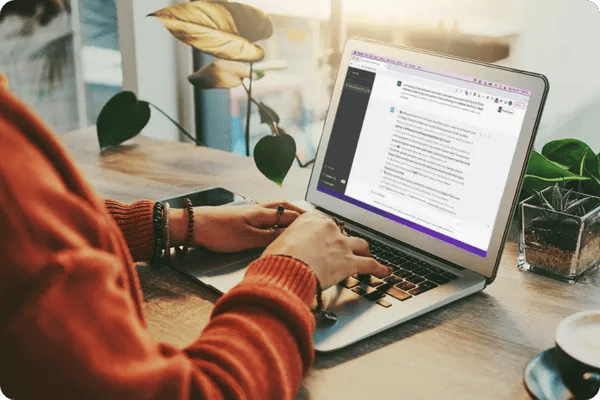
3. Create an event recap video.
An event recap video is a great way to capture the "essence" of your event and share its highlights in a fun, engaging way. In today's digital age, many people enjoy watching videos that visually showcase key moments, speaker highlights, attendee interactions, and the overall atmosphere of a conference.
Here's a step-by-step guide on how to create an effective event recap video:
1. Gather footage throughout your event. Start by collecting video footage from the event. This can include recordings of keynote speeches, panel discussions, attendee interviews, networking sessions, and candid moments that capture the energy and excitement of the event.
2. Select your favorite highlights. Review the footage and identify the most compelling and memorable moments from the event. Focus on key highlights that best represent the theme, purpose, and objectives of the gathering.
3. Craft a storyline. While this may sound difficult, don't overthink it! Make sure the flow of your event recap video makes sense. Then, decide if want to include any conference testimonials, attendee quotes, or voice-over narration to add useful context to the video.
4. Add fun visual elements and music. TikTok, Instagram, and Facebook make it super easy to enhance video recaps with graphics, text overlays, logos, and music. Use these elements to reinforce key messages, highlight information, and maintain visual consistency throughout the video.
5. Edit and polish your video clips. You're nearly done! Use video editing software like CapCut to trim, splice, and arrange the footage into a cohesive narrative. Pay attention to pacing, transitions, and visual effects to ensure a polished and professional-looking final product.
6. Optimize for distribution, then share! Once your event recap video is complete, optimize it for distribution across social media, your website, email newsletters, and other channels to maximize reach and engagement. Then, share it out to extend its reach and impact!
8 Tips for Creating a Compelling Event Recap Video:
- Start with a "hook:" Begin with a captivating opening sequence that grabs viewers' attention.
- Focus on key moments: Highlight keynote speeches, panel discussions, or awards ceremonies.
- Showcase attendee interactions: Include footage of attendees networking and having FUN!
- Feature speaker highlights: Show snippets of keynote presentations or interviews with speakers.
- Add testimonials: Include quotes from attendees, speakers, or sponsors to provide social proof.
- End with a call to action (CTA): Encourage viewers to learn more, register, or follow you on social.
- Optimize for mobile viewing: Ensure your video is easily watchable on smartphones or tablets.
- Measure and analyze viewership: Track views, engagement, and shares to gauge effectiveness.
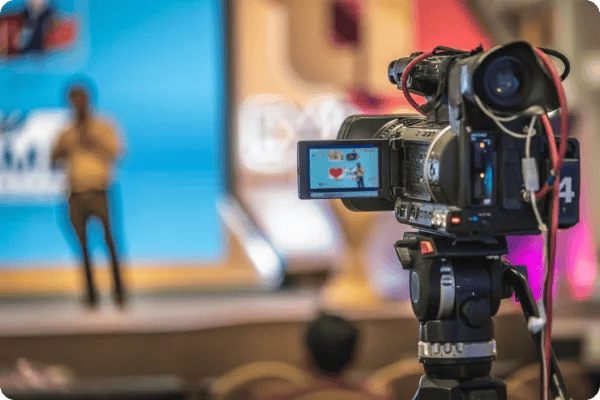
4. Create a post-event social media campaign.
Browsing sites like Facebook, X (formerly Twitter), YouTube, Reddit, and Instagram has quickly become a go-to activity for millions of people throughout the world, especially when we’re feeling bored or have some downtime to spare.
Social media marketing has also become one of the most powerful facets of an event marketing plan, especially for generating sales, building brand awareness, and forming meaningful connections with your audience.
Use your organization’s social media platforms to keep event attendees engaged, not just after your event, but year-round! Head over to Canva to create stunning graphics and videos, or use some of the following social media ideas to keep people talking about your event long after it’s over.
Social Media Engagement Ideas for Event Attendees:
- Write a thank-you message to everyone who attended.
- Create a montage out of photos, testimonials, and event highlights.
- Develop a highlight reel of attendees having fun at your event.
- Host a social media contest with an enticing consolation prize.
- Boost sales by posting an exclusive offer for everyone who attended.
- Get creative with on-brand memes and GIFs that reflect your event.
- Help sponsors by re-featuring their products or services.
- Invite attendees to follow all your organization’s social media accounts.

5. Create an event marketing drip campaign.
Drip marketing involves sending a series of automated emails that encourage people to take action. For example, you may use post-event marketing emails to:
- Encourage attendees to buy tickets to your next event
- Purchase a product or service they saw at your event
- Read a blog you've posted on your social media channel
- Donate to a non-profit organization your event supports
- Watch a video you've posted on your event's YouTube channel
- Sign up for a demo of your organization's product or service
The best part about drip campaigns is that they can be automated with a marketing automation platform like HubSpot or an email marketing tool like MailChimp or Constant Contact. These programs can even help you personalize your emails with data like the person’s name or specific actions they took (like visiting a webpage).
Once your event has concluded, enroll attendees in an email drip campaign. While most email campaigns are about driving sales, remember to balance out copy with useful information and educational tools too!
Once your event has concluded, it’s up to you and your team to determine ways to form meaningful connections with attendees. By keeping them engaged with your brand, you’ll be more likely to spark interest, create conversations, and build your customer base. You’ll also gain valuable insights you may not have had otherwise, including how to make your events even better in the future.
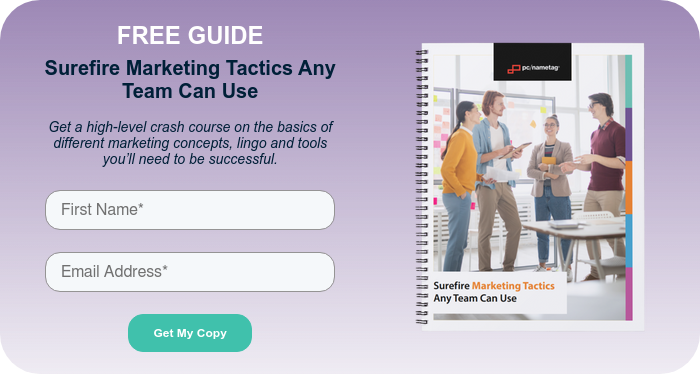
6. Create a survey for post-event attendee data collection.
Attendee feedback is one of the most important parts of evaluating the success of your event. Even if your event sold out, you’ll still want to follow up with guests to make sure they truly enjoyed their experience.
An easy way to collect insight is by creating a survey using Google Forms, SurveyMonkey, Qualtrics, or another survey tool. Remember to keep your survey to ten questions or less. “Short and sweet” is best for a great response rate!
In your email, specify how many questions are in the survey, or how long the survey takes to complete (I.e. “A five-minute survey"). You can even incentivize the survey by giving respondents the chance to win something, such as an event-branded promotional gift, a gift card, a discount, or a free pass to a future event.
Sample Survey Questions for Your Post-Event Survey
A solid event management strategy starts with finding ways to keep your brand top-of-mind and making improvements for future events. Give your audience the best experience possible and discover what appeals most to your target audience by creating a post-event follow-up survey.
To get the most data-driven results possible, browse our curated list of survey questions you may want to consider including in an attendee feedback survey, including the following:
- What factors determined your decision to attend this event?
- Which sponsors do you remember from the event?
- Did this event meet your personal and professional development needs?
- Were the date and time convenient for you?
- How likely are you to be in contact with someone you met through the networking event?
- How likely are you to attend one of our events in the future?
✅ Want a FULL LIST of questions to ask? Fill out the form below to get your free cheat sheet!
If you're looking to improve your post-event engagement efforts, consider creative ways to "recap" your event. And remember - recaps aren't just for immediately after your event; they can be used year-round to boost audience engagement, improve brand loyalty, and keep excitement high!
By incorporating these event recap ideas into your overall post-event strategy, you'll not only leave a lasting impression but also lay the foundation for continued growth as you plan more events.
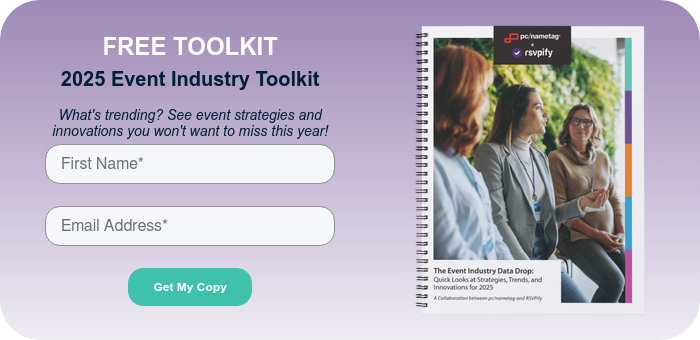



Submit a Comment